AS ONE dream ended at Croke Park last Sunday, another continues.
The first dream was that a team wearing mostly blue from their country’s midlands (work with me here), from an area better known for success in another sport, could end up as champions. It came true for Leicester City, but not for the Tipperary senior footballers.
Yet, continuing the soccer comparison, maybe Mayo will be like Portugal, not just for their combination of red-and-green in their colours, but by winning the trophy as other, more fancied teams fall by the wayside. Mayo will be delighted if they, like the Portuguese, defeat the hosts in the decider - but they won’t mind if they win it against another traditional big gun.
Mayo, certainly, will be going into the All-Ireland final as underdogs, either facing ‘unbeatable’ Dublin or the team who beat ‘unbeatable' Dublin, record winners of the competition Kerry. Sure, you can say they’ll be underdogs for a reason (or many reasons), given they haven’t performed particularly impressively in any Championship game this season. And one can understand the view that even they don’t seem to believe they can actually win the All-Ireland.
My first reaction to their post-semi-final press conference was to think it strange that manager Stephen Rochford and experienced player Keith Higgins talked about their ambition for the year being to get to the All-Ireland final, rather than speak about winning it. Yet, that might actually be clever psychology from the Westerners, reducing pressure on themselves. They’re implying they’ve done what they set out to do - anything else is a bonus.
There’s been - and there will be - more than enough talk about Mayo winning the All-Ireland. Of course, they want to win it, want desperately to do so, but there’s no point them putting pressure on themselves. Besides, what pressure can there be on them if many experts say their final opponents are much better than them?
The truth is rather different: Mayo are a very good team. I was genuinely concerned for Tyrone ahead of their All-Ireland quarter-final against Mayo and not simply because the latter have always proved a hard team to beat for Mickey Harte’s men. It was no great surprise at all to me that the Red Hands lost, especially when their chance/conversion rate fell short of the standards required - although credit to Mayo’s tactics, in part, for that.
How anyone could - or can - write off a team that includes forwards of the calibre of Aidan O’Shea, Andy Moran and Cillian and Diarmuid O’Connor is beyond me. They also have fine midfielders - keeping Tom Parsons out of the starting side - and defenders of the top quality of Keith Higgins, Lee Keegan and Colm Boyle, with excellent goalkeepers too in David Clarke and Rob Hennelly. These Mayo players were only beaten by the last two All-Ireland winners in semi-final replays, having reached the previous two finals, so it’s evident they are consistently one of the top three or four teams around.
On the sideline, they have proven winners, men who have collected club All-Irelands as both players and managers, with selector Tony McEntee having also collected the Sam Maguire as an Armagh player. Such was Tony Mac’s input last Sunday, he probably spent more time on the Croke Park pitch than he did during his triumph with Armagh in 2002.
However they’ve got there, the reality is Mayo are in a very good position - and they’re definitely not dreamers to think they can win this All-Ireland.
OVER the past week or so, my soon-to-be three-year-old son has exhibited some strange behaviour.
First, he touched his toes, ordered me to whistle and then ran out the living room door. On another occasion, he just ran out the same door and leapt feet forward to land on his rear on the light-coloured hall carpet. In another section of the hall, he positioned a pack of nappies and then proceeded to jump over them.
One set of grandparents reported he'd been lying on his back on their floor, swinging his arms back and kicking his legs. I'm not in the slightest bit concerned by this seemingly bizarre stage of his development. He has, of course, been afflicted by 'Olympics fever' and he was doing his versions of a sprint start, the long jump (with that hall carpet obviously representing the sand pit), hurdling and swimming the backstroke. I'm just glad we didn't let him see much boxing or taekwondo.
I realise this is no revelation, but his actions merely confirmed that children do completely copy what they see sports stars doing. We can debate forever about whether or not sportspeople should be regarded as role models and, therefore, have to act according to certain standards of behaviour.
However, there's no debating the fact they simply are role models to children. Children don't have to be aware of what sportspeople do in their private lives, but what they do in public arenas will be copied by impressionable youngsters - and that's always worth remembering.
On that subject, it would be easy for me to condemn boxer Michael Conlan for his outburst of swearing on live TV. Yet, as someone who has a hot temper himself and has been known to utter the odd curse-word about matters of far less import than having your Olympic chance scandalously taken away, I'm not going to, er, point the finger at the Belfast man.
Michael may regret his swearing, but he won't - and shouldn't - regret anything else he said. Conlan did the sport a service by publicly questioning the integrity of the judges and the entire decision-making process of Olympic boxing. Ironically, the AIBA's recent embracing of the 'pro' side of boxing - including inviting professionals to participate in the Olympics and extending to an apparent preference for that style of pugilism among its judges - could come to cost it.
Why would ambitious and talented young men and women involve themselves in such an amateur set-up and risk suffering unfair decisions for political reasons when they could move much more quickly into the pro ranks? Then again, pro boxing isn't exactly beyond question in its decision-making either.








